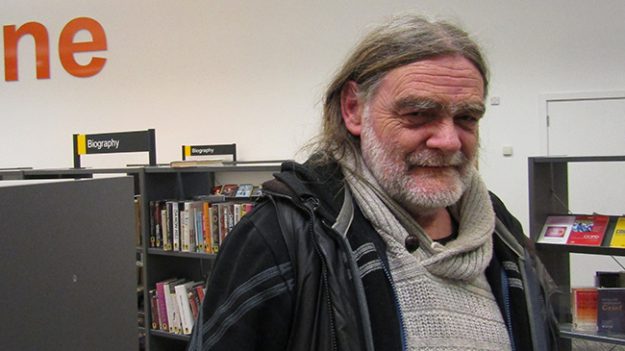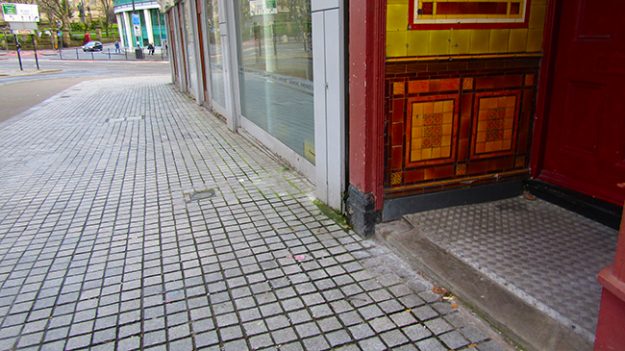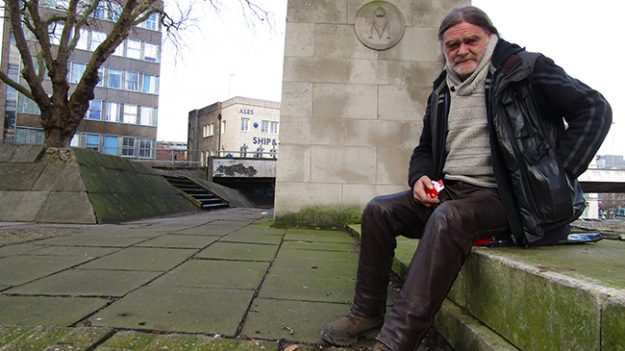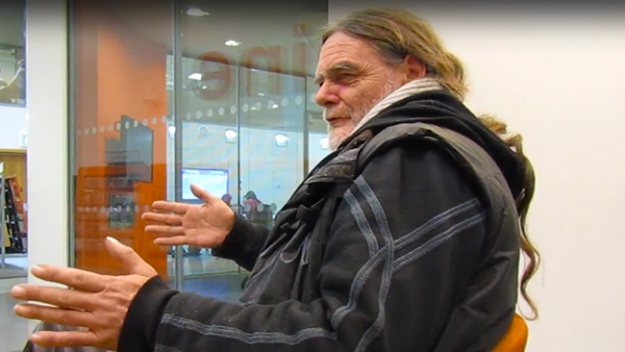Homelessness is a persistent concern for cities like Cardiff, but what happens when someone chooses to stay on the streets to keep out of the system?

Lez’s gruff Blackburn accent is somehow both assertive and reserved as he sits tucked away in the back corner of the city library. He appreciates the building’s traditional grandeur and, although he avoids spending time indoors, he will come inside to check up on his emails. Lez’s lined and wizened face shadows with mistrust as he surveys the modern bookshelves and glass dividers surrounding him. But as he begins to speak, his eyes shine a quality which can be described as little else but maverick.
“They say everyone’s part of the system. One, I’m not part of it and two, it’s not a system. It’s not a system if it just doesn’t work,” he says. “Me? Well I’m Lez. L.E.Z. That’s as far as the names go.”
See the world through Lez’s eyes.
For the past 20 years, Lez has been all over the British Isles. He discusses South Wales; Cardiff, Cross Keys and Swansea (“horrible place”) as well as Lancaster and Blackburn (“should be bulldozed off the map”). For the past 18 months, however, Lez has been living on the streets of Liverpool.
On the edge of the city-centre, a row of commercial properties face the public library, alongside the mouth of the great Queensway Tunnel. Nestled in the alcove of a salon doorway is where Lez makes his bed for the night. He sets up once the shop is closed for business and is always packed away before opening. The owners of the salon say he walked over one day and made formal introductions, asking if it would be okay with them if he stayed in their doorway. Lez has been there ever since, becoming as much a part of the landscape there as the architecture he so admires.

“I just like it…it’s an old city,” he says. “If you can’t relate to the population, you can relate to the city, you know?”
The regulars of the café next door all know Lez, as do many of the passers-by. They nod or stop for a chat if they see him in his usual spot, sitting on the top of a set of steps opposite the shops. Lez likes his own company and has little need to deviate from this corner of the city. Here, he is away from the hordes of tourists, shoppers and the majority of the city’s other homeless. And Lez is content outdoors, even in the cold.
“Before I came here I was in a hostel and all the kids used to say to me, we can always tell which is your room because the windows are open in winter,” he says. “I suppose I’ve just got acclimatised to it, you know what I mean?”
Hostels and homeless shelters would perhaps seem like a preferable choice to sleeping on the streets. However, Lez says hostels are crowded with people constantly knocking on his door asking for money or tobacco.
“I can live better on the street, you know what I mean? Alright, I might only get four decent night’s sleep out of seven, but it’s still better than a hostel where you don’t get any,” he says.

Desperate circumstances can also lead to tensions and fighting amongst residents. A new emergency homeless shelter opened up nearby over the winter, but Lez chose to stay where he was.
“How many squad cars parked outside that place, I thought the cops had volunteered to work there,” he says, the spontaneous joke arising with a gruff chuckle and glint in his eyes.
It is estimated that one in every two hundred people are homeless in the United Kingdom. In Cardiff alone there have been at least 1,400 individuals recorded sleeping on the streets over just 25 months. This issue was brought particularly into focus when a homeless woman died in Alexandra Gardens after freezing temperatures this winter.
Causes for homelessness involve complex circumstances and differ for every individual, although issues with addiction have been a long-documented and frequent complication. For this reason, Lez prefers to remain alone rather than with others of the homeless community.
“Absolutely nothing in common whatsoever. I do talk to them but I don’t socialise…it’s just, you alright? How are you? Right, goodbye,” he says. “I don’t drink, I don’t use drugs…I’ve always had sense to stay away from those things.”
Lez, however, does not sleep on the streets through desperation, as many individuals in Cardiff and other cities across the U.K. do. He is intent on remaining out of the government system, one which he insists is equipped only to suit those at the top.

“Get them to vote for me,” says Lez. “They’re not my government, I could do better than they do.”
Lez does not receive any state benefits or follow job-centre programs and says he has no intention of doing so again in the future.
“They tried to get me on a community work program…It’s compulsory, slave-gang, chain labour. [They’re] punishing us for being unemployed and it’s [their] fault we’re unemployed,” he says. “I’ve got no qualifications. I’m nearly 60, no-ones gonna employ me, you know what I mean?”
Although he does not have paid employment, Lez has found ways to contribute to his own corner of society.
“The window cleaner wasn’t cleaning the windows properly so I started doing them. Just as a favour,” he says. “For the girls in hairdressers.”
The business-owners along the street say Lez often offers to help out and is always getting involved. They have become good friends and he has even given them birthday presents. They look out for Lez and are concerned for his well-being, should he choose to remain on the streets as he gets older.
Somehow, this rather eccentric lone-wanderer has stumbled upon a perfectly ordinary row of local businesses and become completely absorbed into their close community.

But what about the future?
“I’ll probably stay in Liverpool till this mortal body’s dead,” says Lez. “I just like it…you know what I mean?”
